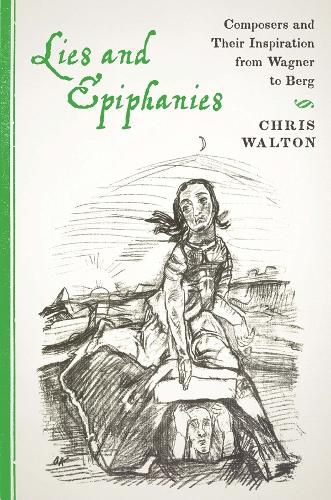Readings Newsletter
Become a Readings Member to make your shopping experience even easier.
Sign in or sign up for free!
You’re not far away from qualifying for FREE standard shipping within Australia
You’ve qualified for FREE standard shipping within Australia
The cart is loading…






Lies and Epiphanies offers case studies of inspiration in five composers – Richard Wagner, Gustav Mahler, Wilhelm Furtwangler, Richard Strauss, and Alban Berg. Their own tales of their epiphanies played a determining role in the reception history of their works: the finale of Mahler’s Second Symphony was supposedly born of a lightning bolt of inspiration at the funeral of Hans von Bulow, while Alban Berg’s Violin Concerto was purportedly his direct response to the tragic early death of Alma Mahler’s daughter.
Chris Walton looks behind these tales to explore instead the composer’s dual role as author and self-commentator, laying bare the fissures and inconsistencieswithin these artists’ testimonies and revealing how the putatively extrarational world of creative inspiration intersects with the highly rational world of money and politics. As Walton points out, the composer often imposes on the audience an interpretation of a work and its genesis that is as superficial as the score itself is not. This study seeks to show why.
Chris Walton teaches music history at the Basel University of Music in Switzerland.He is the author of Othmar Schoeck: Life and Works (University of Rochester Press, 2009) and Richard Wagner’s Zurich: The Muse of Place (Camden House, 2007).
$9.00 standard shipping within Australia
FREE standard shipping within Australia for orders over $100.00
Express & International shipping calculated at checkout
Lies and Epiphanies offers case studies of inspiration in five composers – Richard Wagner, Gustav Mahler, Wilhelm Furtwangler, Richard Strauss, and Alban Berg. Their own tales of their epiphanies played a determining role in the reception history of their works: the finale of Mahler’s Second Symphony was supposedly born of a lightning bolt of inspiration at the funeral of Hans von Bulow, while Alban Berg’s Violin Concerto was purportedly his direct response to the tragic early death of Alma Mahler’s daughter.
Chris Walton looks behind these tales to explore instead the composer’s dual role as author and self-commentator, laying bare the fissures and inconsistencieswithin these artists’ testimonies and revealing how the putatively extrarational world of creative inspiration intersects with the highly rational world of money and politics. As Walton points out, the composer often imposes on the audience an interpretation of a work and its genesis that is as superficial as the score itself is not. This study seeks to show why.
Chris Walton teaches music history at the Basel University of Music in Switzerland.He is the author of Othmar Schoeck: Life and Works (University of Rochester Press, 2009) and Richard Wagner’s Zurich: The Muse of Place (Camden House, 2007).